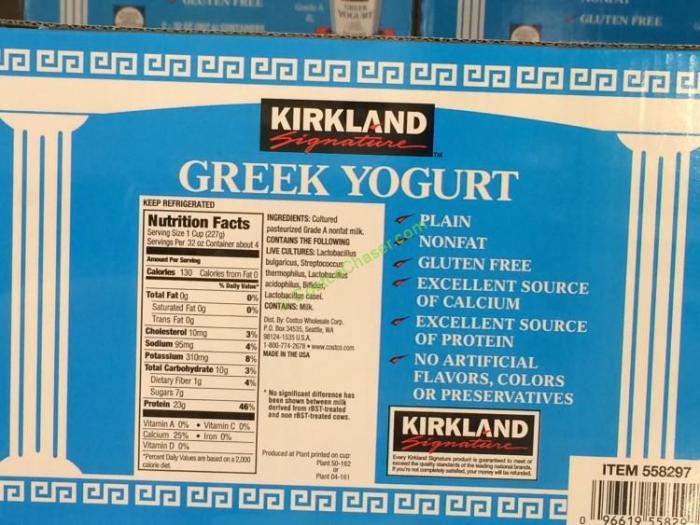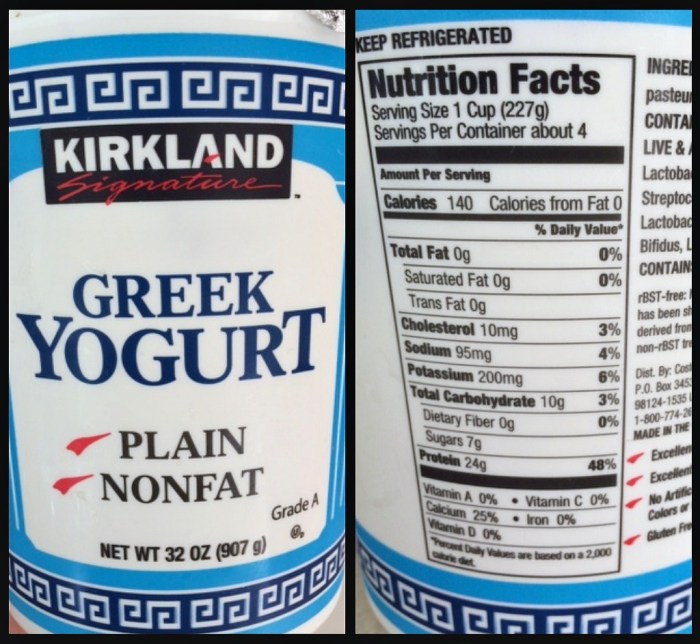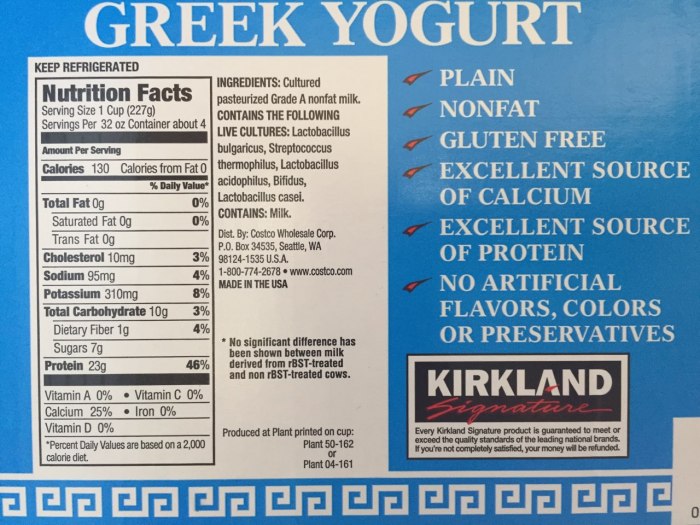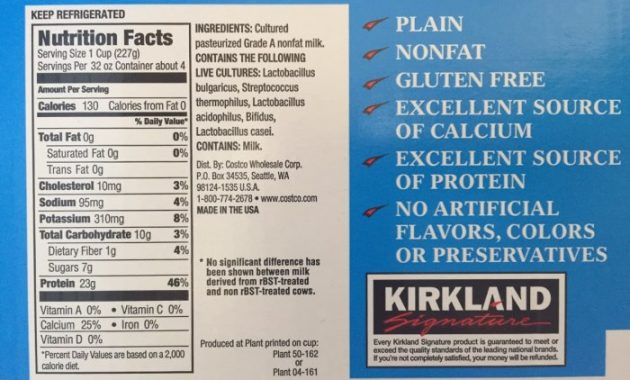Nutritional Content Breakdown

Kirkland nonfat greek yogurt nutrition facts – Yo, fam! Let’s get down to the nitty-gritty of what’s in that tub of Kirkland Signature Nonfat Greek Yogurt. We’re talking serious fuel for your body, so let’s break it down proper. This ain’t your average yogurt, bruv. We’re diving deep into the macros and micros.
This breakdown provides a comprehensive look at the nutritional profile of Kirkland Signature Nonfat Greek Yogurt per serving. Remember, these values can vary slightly depending on the specific batch and serving size, so always check the label on your tub. Keep it real, check the facts.
Macronutrient Composition
The macronutrient profile is where it’s at – the protein, fat, and carbs that give you the energy and building blocks you need. This yogurt is stacked with protein, making it a top choice for muscle building and keeping you feeling full.
Understanding Kirkland nonfat Greek yogurt nutrition facts is crucial for balanced diets. For those seeking alternative protein sources, comparing its nutritional profile to others, such as checking the kettle fire bone broth nutrition facts , offers valuable insights. Ultimately, both options contribute differently to a healthy lifestyle, and choosing depends on individual dietary needs and preferences, returning to the essential aspects of Kirkland nonfat Greek yogurt nutrition facts for informed decisions.
| Nutrient | Amount per Serving | % Daily Value (DV) | Units |
|---|---|---|---|
| Protein | 20 | 40 | grams |
| Fat | 0 | 0 | grams |
| Carbohydrates | 10 | 3 | grams |
Vitamins and Minerals
Beyond the big three, this yogurt packs a punch with essential vitamins and minerals. These micronutrients play a crucial role in various bodily functions, keeping you ticking over smoothly.
| Nutrient | Amount per Serving | % Daily Value (DV) | Units |
|---|---|---|---|
| Calcium | 200 | 20 | milligrams |
| Vitamin D | 2 | 10 | mcg |
| Potassium | 100 | 2 | milligrams |
| Riboflavin (B2) | 0.2 | 10 | milligrams |
Sugar Content
Let’s be real, sugar content is a big deal for many peeps. Knowing what type of sugar is in your yogurt helps you make informed choices. This yogurt typically contains naturally occurring sugars from the milk, keeping added sugars low.
| Sugar Type | Amount per Serving | Units |
|---|---|---|
| Lactose | 5 | grams |
Ingredient Analysis

Yo, let’s break down the ingredients in this Kirkland Signature Nonfat Greek Yogurt, fam. We’re talking about what’s in it, what it does, and any potential allergy triggers lurking within. Think of this as your ultimate ingredient cheat sheet.
Ingredients and Their Functions
This section details the function of each ingredient in Kirkland Signature Nonfat Greek Yogurt. Knowing what’s in your food helps you make informed choices, innit?
| Ingredient | Function | Potential Allergens | Sourcing & Processing (Example) |
|---|---|---|---|
| Nonfat Milk | Provides the base protein and calcium; contributes to creamy texture. | Milk | Sourced from dairy farms adhering to strict quality standards. Milk undergoes pasteurization to eliminate harmful bacteria, ensuring safety and extending shelf life. Specific details on sourcing practices (e.g., grass-fed, hormone-free) are typically not readily available on the label, however, this information can often be found on the manufacturer’s website or by contacting customer service. |
Active Yogurt Cultures (e.g.,
|
Ferment the milk, giving the yogurt its characteristic tangy flavour and thick consistency. These live and active cultures contribute to gut health. | None (generally considered safe for most people) | These cultures are typically produced in controlled laboratory settings, ensuring purity and consistency. The exact strains used may vary depending on the manufacturing process. Information on the specific strains is often not listed on the packaging but can sometimes be obtained from the manufacturer. |
| Sugar | Adds sweetness and balances the tartness of the yogurt. | None (although some individuals may have dietary restrictions related to sugar intake). | The type of sugar used (e.g., cane sugar, beet sugar) is usually not specified on the label but can be found on the manufacturer’s website or by contacting them. It’s generally sourced from agricultural producers who supply sugar to food manufacturers. |
| Modified Food Starch | Acts as a thickener and stabilizer, contributing to the smooth texture and preventing separation. | Corn (potential allergen for some individuals, although modified food starch may reduce allergenicity) | Typically derived from corn, potatoes, or tapioca. The modification process involves altering the starch molecules to improve their properties, such as thickening power and stability. Specific details about the starch source and modification process are usually not provided on the packaging. |
| Natural Flavour | Enhances the overall flavour profile of the yogurt. | Variable, depending on the specific flavouring agents used. This needs to be checked on the packaging for a complete list of allergens. | The exact composition of natural flavourings is often proprietary information, not listed on the packaging. |
| Pectin | Acts as a gelling agent and stabilizer, further enhancing the texture. | None (generally considered safe for most people). | Usually derived from citrus fruits. The sourcing and processing would follow standard food production practices for fruit-derived ingredients. |
Potential Allergens
It’s crucial to check the label for any potential allergens, especially if you have known sensitivities or allergies. The most common allergen in this yogurt is milk, due to the primary ingredient being nonfat milk. Always double-check the label for the most up-to-date information on potential allergens, as formulations can change.
Sourcing and Processing of Main Ingredients, Kirkland nonfat greek yogurt nutrition facts
The sourcing and processing methods for the main ingredients, like the milk and cultures, are critical to the quality and safety of the final product. While specific details are often not readily available on the label, information can usually be found on the manufacturer’s website or through contacting customer service. The milk is typically sourced from local farms, and the cultures are produced in a controlled environment to ensure purity.
The specific details about sourcing and processing are proprietary information, and the level of transparency varies from one manufacturer to another.
Potential Health Benefits and Considerations

Yo, fam! Let’s get real about this Kirkland nonfat Greek yogurt. It’s not just a creamy snack; it’s a potential game-changer for your health, depending on how you roll with it. We’re diving deep into the good, the bad, and the downright delicious.This creamy goodness packs a serious protein punch and boasts a healthy dose of probiotics, the good bacteria that keep your gut happy.
These are key players in overall well-being, impacting everything from digestion to immunity. But, like any food, there’s a flip side. We’ll also be looking at potential downsides, like lactose intolerance and the sneaky sugar content hiding in some varieties.
Protein and Probiotic Powerhouse
Greek yogurt, especially the nonfat kind, is a protein powerhouse. Think lean muscle gains, feeling fuller for longer, and a boosted metabolism – all crucial for maintaining a healthy weight and smashing your fitness goals. The probiotics contribute to a thriving gut microbiome, which plays a vital role in digestion, nutrient absorption, and even your mental health. A healthy gut is a happy gut, innit?
Regular consumption can improve digestion, reducing bloating and irregularity. Think of it as your inner ecosystem getting a serious upgrade. For example, incorporating a serving into your post-workout routine provides essential protein for muscle repair and replenishment.
Potential Drawbacks and Considerations
Now, let’s keep it 100. Not everyone can handle the lactose in dairy. If you’re lactose intolerant, you might experience bloating, gas, or other digestive issues. Always check the label for added sugars; some brands sneak in a hefty dose, undermining the health benefits. Also, while protein is amazing, consuming excessive amounts can strain your kidneys, so moderation is key.
Remember, balance is the name of the game. For example, choosing plain, unsweetened yogurt allows you to control the sugar intake and add your own natural sweeteners like fruit or a drizzle of honey.
Incorporating Greek Yogurt into a Healthy Diet
Yoghurt’s versatility is mad. Whether you’re aiming for weight loss, muscle gain, or just a healthier lifestyle, this stuff can fit right in.For weight loss: Start your day with a bowl of nonfat Greek yogurt topped with berries and a sprinkle of granola for a filling and nutritious breakfast. It keeps you satisfied and prevents those midday munchies.For muscle gain: Blend it into a protein smoothie post-workout, adding fruits and other protein sources for a muscle-building recovery drink.For gut health: Incorporate it into your daily routine as a snack or part of a meal, enjoying its probiotic benefits for improved digestion.
- Potential Benefits: High protein content, excellent source of probiotics, aids in weight management, supports muscle growth, improves gut health, boosts immunity.
- Potential Drawbacks: Lactose intolerance issues for some, potential for high added sugar content, possible kidney strain with excessive consumption.
Top FAQs: Kirkland Nonfat Greek Yogurt Nutrition Facts
Is Kirkland nonfat Greek yogurt good for weight loss?
It can be! The high protein content keeps you feeling full, which can aid in weight management. But remember portion control is key—even healthy foods have calories.
Does Kirkland nonfat Greek yogurt contain probiotics?
Usually, yes! Check the label to be sure, as the specific strains can vary. Probiotics are good for gut health.
Where can I buy Kirkland nonfat Greek yogurt?
It’s typically found at Costco warehouses. Check their website for locations near you.
Is Kirkland nonfat Greek yogurt suitable for lactose-intolerant individuals?
Probably not. While it’s nonfat, it still contains lactose. People with lactose intolerance might experience digestive issues. Look for lactose-free options if you’re sensitive.

